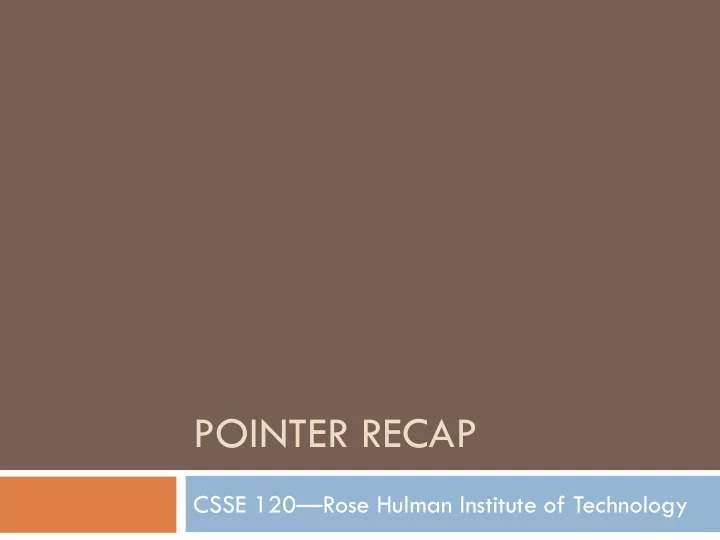

POINTER RECAP CSSE 120 — Rose Hulman Institute of Technology
Recap: Declarations Reserve Space Variable declarations reserve space in memory: int x; /* reserves enough space for an int, names it x */ double d; /* reserves enough space for a double, names it d */ Formal parameter declarations do the same: void average(double sum, int count) {…} /* reserves enough space for a double (named sum ) and an int (named count )*/
Recap: Variables with "Pointer Types" Store Addresses Besides holding "things" like ints and doubles, variables in C can also hold memory addresses Samples: int *xPtr; /* reserves enough space for an address, names it xPtr , says that xPtr can store the address of another variable that holds an int */ double *dPtr; /* reserves enough space for an address, names it d Ptr , says that dPtr can store the address of another variable that holds a double */
Recap: Pointer Operators, & The address operator, & : &var gives the address where var 's value is stored Examples: xPtr = &x; /* Read " xPtr gets the address of x " */ dPtr = &d; /* Read " d Ptr gets the address of d " */
Recap: Pointer Operators, * Use * two ways: In type declarations, * says that the name refers to address of something: int *xPtr; double *dPtr; In expressions, *var gives the "thing" pointed to by var Examples: The format string, "%d" , says that we want printf("%d", *xPtr); to print an int. *xPtr is the thing pointed to by xPtr . That is, *xPtr is the value of x . *dPtr = 3.14159; This says that the thing pointed to by dPtr should get the value 3.14159 . So the result is the same as d = 3.14159 .
Pointer Assignments int x=3, y = 5; int *px = &x; int *py = &y; printf("%d %d\n", x, y); *px = 10; printf("%d %d\n", x, y); /* x is changed */ px = py; printf("%d %d\n", x, y); /* x not changed */ *px = 12; printf("%d %d\n", x, y); /* y is changed */
Pointer Pitfalls Don't try to dereference an unassigned pointer: int *p; *p = 5; /* oops! Program probably dies! */ Pointer variables must be assigned address values. int x = 3; int *p; p = x /* oops, RHS should be &x */ Be careful how you increment *p +=1; /* is not the same as … */ *p++;
Recap: Another look at the use of & in scanf int x, y; scanf("%d %d", &x, &y); What would happen if we used y instead of &y ?
We're not Punkin' you !
Recap: Using Pointers to "Return" Multiple Results C only allows us to return one value from a function Can use pointers to return multiples Suppose we want a function that takes an array and returns the mean, min, and max values: void calcStats(double values [ ], int count, double *mean, double *min, double *max) { /* … some logic omitted …*/ *mean = meanValue; This says that the thing pointed to *min = minValue; by mean should get the value stored in meanValue . *max = maxValue; }
Arrays as function parameters int [ ] and int * are equivalent, when used as formal parameters in a function definition. void f (int a[], int count) { … void f (int *a, int count) { … Note that in neither case can we know the size of the array, unless it is passed in as a separate parameter. In either case, element 5 of a can be equivalently referred to as a[5] *(a+5)
Using a pointer to step through an array int arraySum(int *a, int count) { int *final = a + count; int *current; int sum = 0; for (current = a; current < final; current++) sum += *current; return sum; } Calling the arraySum function: int numArray[] = {3, 4, 5, 6, 7, 8}; printf("Array sum is %d\n", arraySum(numArray, 6));
A function to exchange the values of two variables Call it swap
Recommend
More recommend